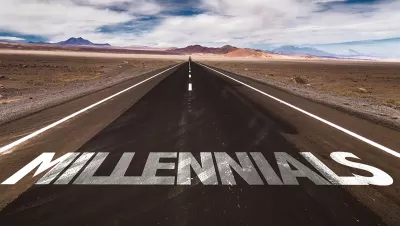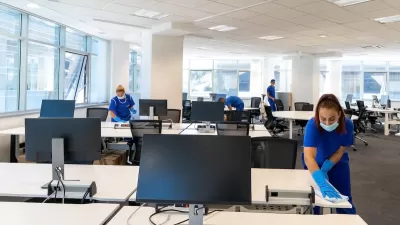Yonah Freemark throws cold water on the notion that the country is becoming less auto-dependent. Yes, millennials are less auto-oriented than older were, but they haven't stopped per-capita vehicle miles traveled from increasing.

Freemark of The Transport Politic notes that some "hopeful commentators" are banking on today's millennials (those between ages 18 to 34 in 2015) who have shown a greater inclination for transit usage, biking, and living in cities than preceding generations, to realize "a less car-dependent future." But "(t)he basic facts of life on the ground in America—that our country is an automobile-oriented society—remain the case."
Marginal changes in the way a new generation behaves, or even major changes in the way a new generation thinks, cannot overcome the realities of a country where more than three-fourths of jobs are located more than three miles of downtowns and where only one-fourth of homes are in places that their residents refer to as urban.
That is not to say progress has not been made, and yes, millennials have been key to the increase in transit usage in the "top ten transit cities" (see chart at the base of the article). Seattle showed a stunning 58 percent increase from 2005-2014, while the lowest increase was seen in Baltimore, 3 percent.
But the truth is that the dominant reality is actually a move toward more cars.
The growth in driving, again, should not be a huge surprise. Peoples’ lives are built around the environment in which they live, and that landscape changes slowly. Neighborhoods where it was hard to get around by anything but driving 20 years ago likely have remained that way and will continue to work as such for the next 20 years. Solving' the suburban reliance on cars in any region is impossible when communities are so spread apart and mixed uses are so limited in their availability.
His pessimistic (or realistic) outlook on suburbs should inspire those who are working to bring density increases of any scale and mixed uses to suburbia to increase transit and biking—as their work can really make a difference.
Freemark also points to "(t)he more recent uptick in per-capita vehicle miles traveled (VMT) that has occurred since mid-2014, coinciding with a reduction in gas prices," writing that it "has failed to dim this argument among some," referencing a CityCommentary by City Observatory contributor, Joe Cortright.
Cortright asks, "Does the upsurge in driving really signal an end to the millennial abandonment of motoring? Is there a renewed 'love affair' with automobile?"
We would argue no: The cultural explanations of the driving trends have to be read in the context of prices. Millennials coming of age in the era of $4.00 a gallon gas behave very differently than baby boomers who paid 29 cents a gallon.
Recent information on commuting habits of millennials, as well as other age groups can be found under the tag, "American Community Survey."
FULL STORY: America’s car obsession will not be diminished by Millennials alone

Planetizen Federal Action Tracker
A weekly monitor of how Trump’s orders and actions are impacting planners and planning in America.

Maui's Vacation Rental Debate Turns Ugly
Verbal attacks, misinformation campaigns and fistfights plague a high-stakes debate to convert thousands of vacation rentals into long-term housing.

Cuomo Is the Candidate of Both NIMBYs and Developers. What Gives?
In the New York City mayoral race, odd bedfellows align to preserve the housing status quo.

The Subversive Car-Free Guide to Trump's Great American Road Trip
Car-free ways to access Chicagoland’s best tourist attractions.

San Antonio and Austin are Fusing Into one Massive Megaregion
The region spanning the two central Texas cities is growing fast, posing challenges for local infrastructure and water supplies.

Charlottesville Temporarily Has No Zoning Code
A judge ordered the Virginia city to throw out its newly revised zoning code, leaving permitting for new development in legal limbo.
Urban Design for Planners 1: Software Tools
This six-course series explores essential urban design concepts using open source software and equips planners with the tools they need to participate fully in the urban design process.
Planning for Universal Design
Learn the tools for implementing Universal Design in planning regulations.
Heyer Gruel & Associates PA
JM Goldson LLC
Custer County Colorado
City of Camden Redevelopment Agency
City of Astoria
Transportation Research & Education Center (TREC) at Portland State University
Jefferson Parish Government
Camden Redevelopment Agency
City of Claremont





























